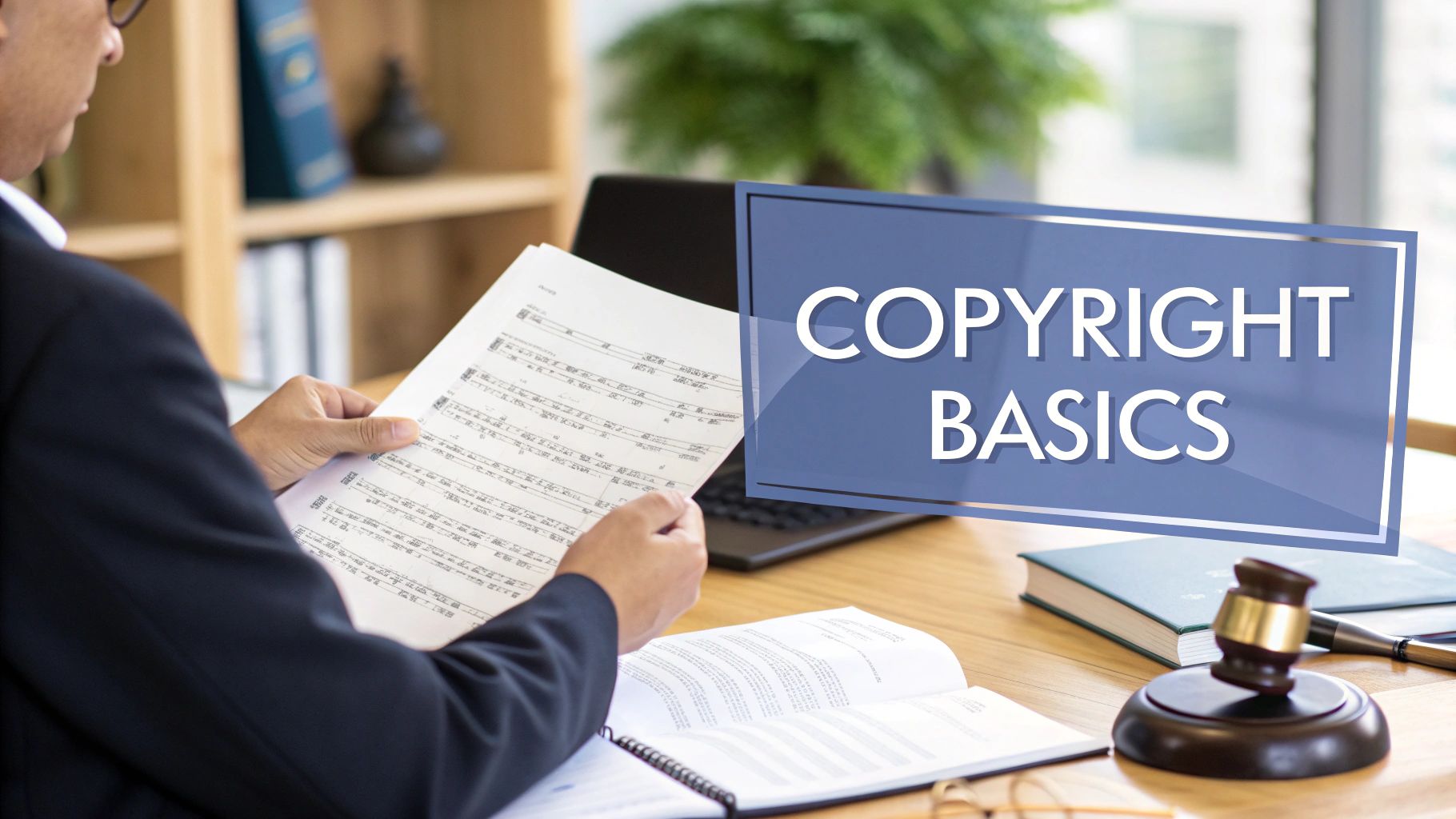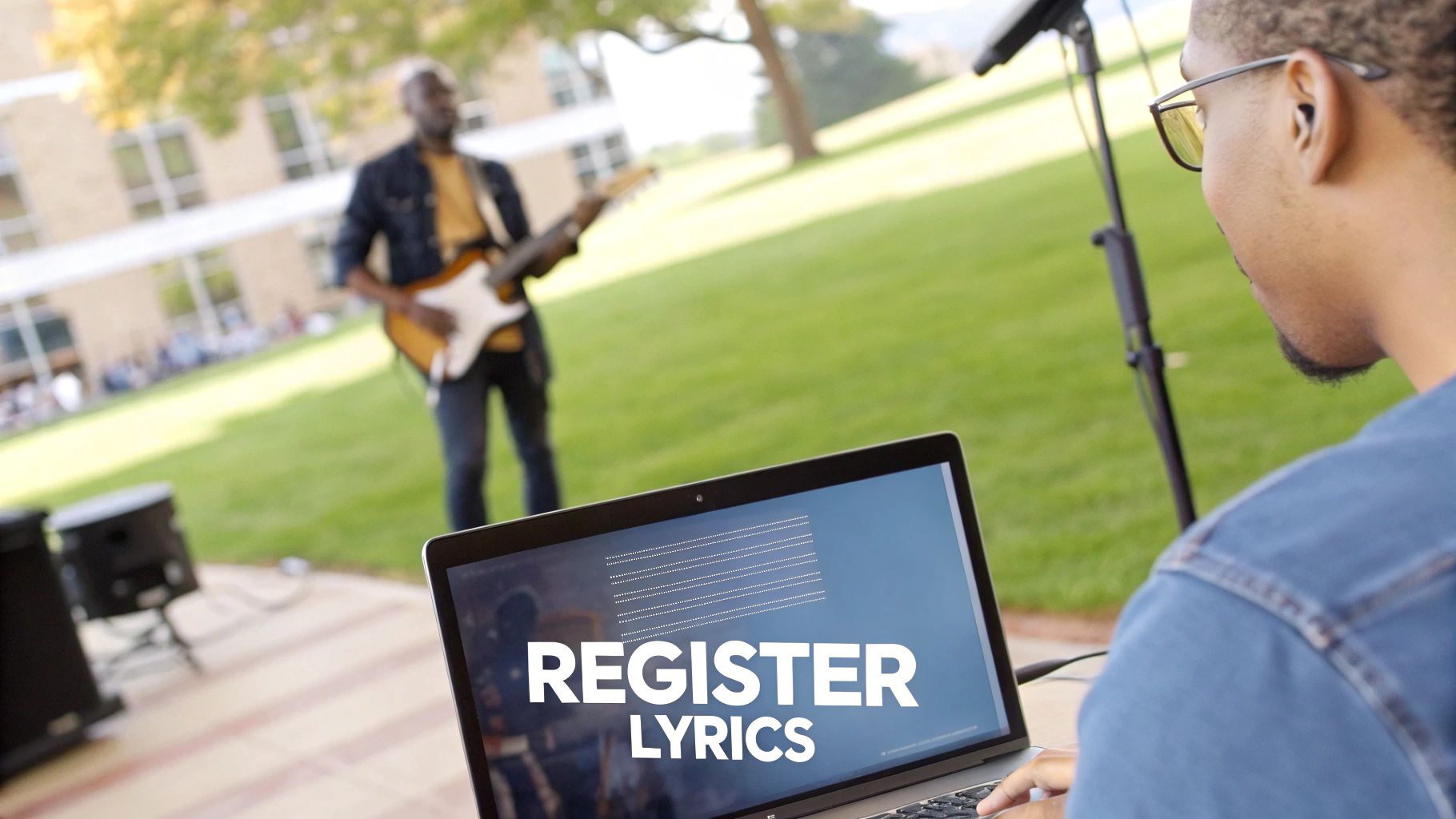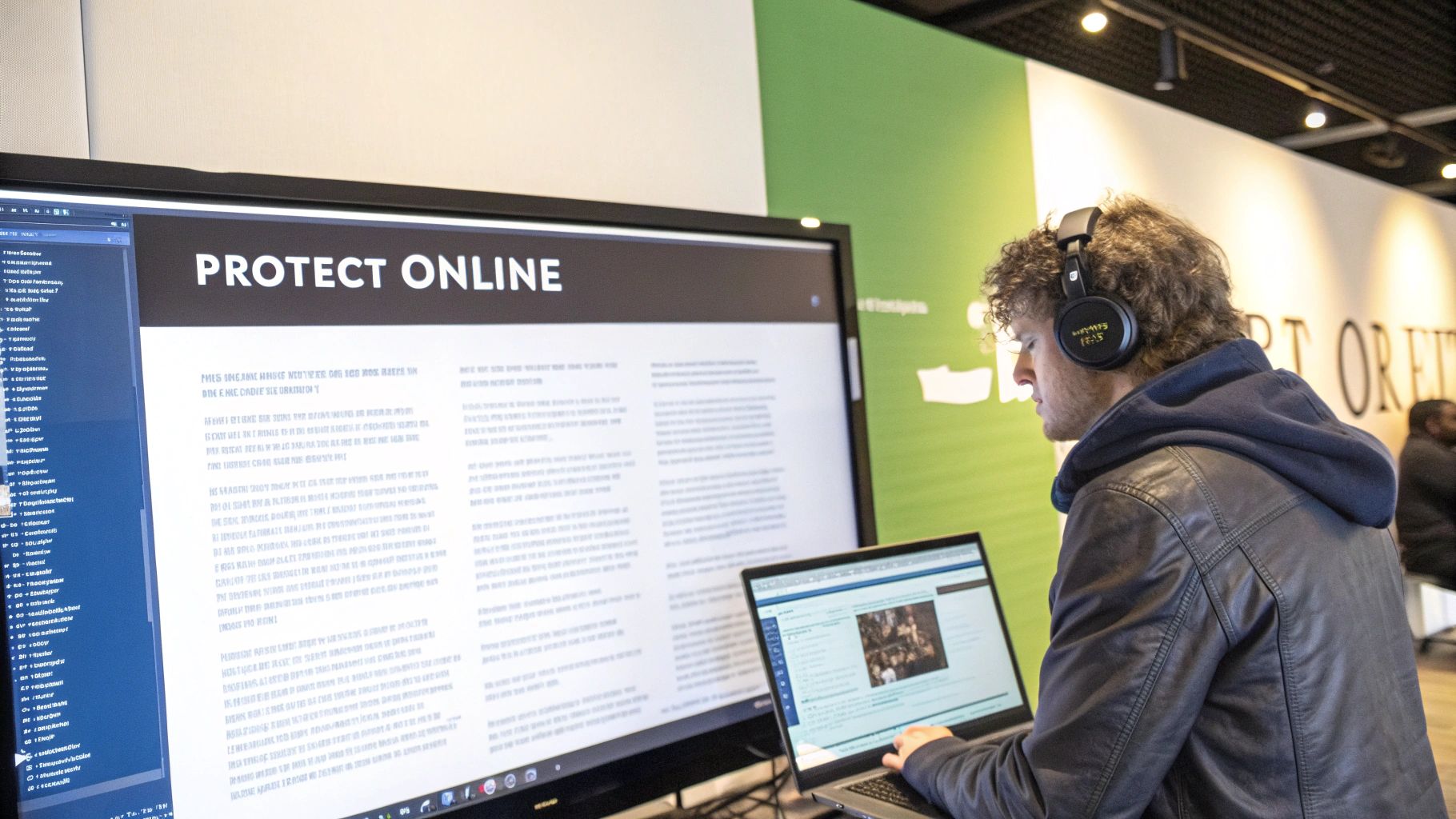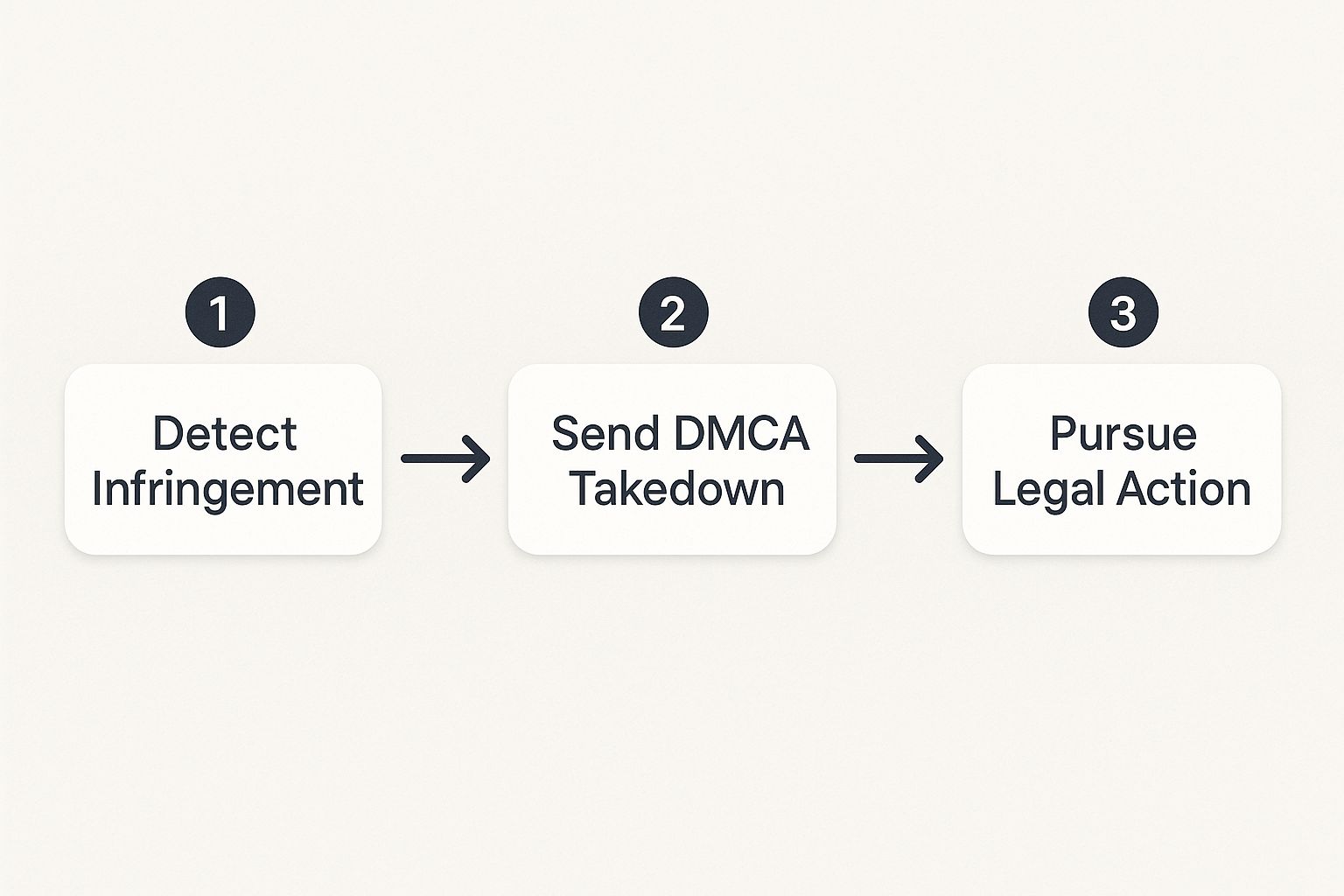Believe it or not, your lyrics are already protected by copyright the second you write them down or hum them into a voice memo. This is what鈥檚 known as automatic copyright, and it鈥檚 your fundamental protection as a creator. But for any serious songwriter, this basic safety net just isn鈥檛 enough.
Your Rights The Moment You Write Your Lyrics

It surprises a lot of songwriters to learn they already own the copyright to their lyrics. The law is on your side from the moment your creative work is "fixed in a tangible medium"鈥攁 fancy way of saying written in a notebook, typed in a text file, or saved as a recording.
This means you automatically, inherently have the exclusive right to:
- Reproduce your lyrics
- Create derivative works (like new arrangements or translations)
- Distribute copies to the world
- Display the lyrics publicly
In the United States, this initial protection is solid, lasting for your entire life plus 70 years. That gives your work some serious long-term value for you and your heirs. You can dig deeper into these baseline protections over at .
The Limits of Automatic Protection
So if you're covered automatically, what's the big deal? Well, relying only on that automatic copyright is a risky game. While you technically own the rights, proving it without official paperwork is an uphill battle.
Imagine someone nabs your lyrics and turns them into a chart-topping hit. Without a formal registration, you're stuck in a messy "he said, she said" legal fight that鈥檚 incredibly expensive and tough to win. Your claim is only as good as your evidence.
Think of automatic copyright as owning a piece of land without the official deed. You know it鈥檚 yours, but you can鈥檛 legally defend your ownership against squatters or sell it without that registered document.
This is where formal registration with the U.S. Copyright Office comes in. It takes your ownership from an abstract idea and turns it into a concrete, public record. It鈥檚 the definitive proof you need to enforce your rights, seek damages for infringement, and unlock the full commercial power of your lyrics.
To make it crystal clear, let鈥檚 break down what you get automatically versus what you gain with registration.
Automatic vs Registered Copyright: A Quick Comparison
Here's a simple table that highlights the key differences between the copyright you get just by creating something and the powerhouse protection you gain by formally registering it.
| Feature | Automatic Copyright (Unregistered) | Registered Copyright |
|---|---|---|
| Proof of Ownership | Difficult to prove; relies on your personal records and evidence. | Establishes a public, official record of your ownership claim. |
| Ability to Sue | You cannot file a lawsuit for copyright infringement in federal court. | Gives you the legal right to sue infringers in federal court. |
| Statutory Damages | You can only sue for actual damages and profits, which are hard to prove. | Makes you eligible for statutory damages ($750 – $150,000) and attorney's fees. |
| Public Notice | No public record exists, so others may infringe without knowing. | Puts the world on notice that you are the copyright owner. |
| Time Limit on Infringement | Can only sue for infringements that happened after you created the work. | Can sue for infringements that occurred even before your registration was finalized. |
The takeaway is simple: while automatic copyright is a nice starting point, it's the registered copyright that gives you the legal teeth you need to truly protect and profit from your work.
Why Formal Registration Is a Non-Negotiable

So, is going through the whole official registration process really worth the hassle? Absolutely. Think of it like this: your automatic copyright is a simple lock on your door, but formal registration is a full-fledged security system with cameras and alarms. It turns your ownership from a simple concept into a powerful legal tool.
Without it, your hands are tied. You can鈥檛 file a lawsuit for copyright infringement in federal court until your work is officially registered with the U.S. Copyright Office. That one fact is a complete game-changer, giving you the legal muscle to actually challenge someone who steals or misuses your lyrics.
This legal power comes with some serious financial teeth for anyone who infringes on your work. With a registered copyright, you can sue for:
- Statutory Damages: These are predetermined financial penalties that can run from $750 up to $150,000 for each infringement. This is a massive deterrent that doesn't require you to prove exactly how much money you lost.
- Attorney's Fees: You can also potentially recover your legal fees from the other party, which makes pursuing a claim financially possible for independent artists.
Beyond the Courtroom: The Professional Edge
But registration isn't just about lawsuits; it鈥檚 about building a legitimate career in music. A registered copyright is a tangible asset. It鈥檚 your official, undeniable proof that you own your work, which is critical when you start dealing with industry professionals.
When you're pitching lyrics to publishers, record labels, or trying to land a sync licensing deal, showing them your certificate of registration proves you're serious and that your intellectual property is buttoned up.
A registered copyright isn't just a defensive shield; it's a professional credential. It signals to the industry that you value your creative work and have taken the official steps to protect it as a valuable asset.
This is more important than ever, especially with digital piracy being a constant threat. Back in 2021, the estimated global value of digital piracy was a staggering $63.6 billion. That number alone shows you just how widespread the risk of unauthorized use really is.
Ultimately, knowing how to copyright your lyrics is only one piece of the puzzle. You'll want to protect the entire musical composition, too. You can get the full rundown on that by checking out our guide on how to copyright music as a whole.
Preparing Your Lyrics for Official Registration

Before you even think about heading over to the U.S. Copyright Office's website, take a beat to get your house in order. A little prep work now saves a world of headaches later. Think of this as your pre-flight checklist; getting everything organized will make the actual application process much smoother and help you avoid the common mistakes that can delay everything.
First thing's first: create a clean, final version of your lyrics. I'm not talking about a notebook page with scribbled-out lines and coffee stains. You need a definitive, professional document that is free of typos and alternate ideas. This is the official work you're asking the government to protect.
Next, you have a key decision to make about the scope of your registration. Are you just copyrighting the lyrics as a standalone literary work? Or are you registering the lyrics and the melody together as a single musical work? Both are perfectly valid, but they require different bits of information on the application form, so it's best to know your game plan from the start.
Handling Collaborations
If you co-wrote the song, this prep stage is non-negotiable. Trust me, misunderstandings over ownership splits are one of the biggest reasons collaborators end up in nasty legal disputes down the road.
Before you file anything, make sure you have this information locked down from every single co-writer:
- Their full legal name and current mailing address.
- A clear, written agreement on their percentage of ownership. A simple songwriter split sheet is perfect for this and should be considered essential.
- Their explicit consent to be listed as a co-author on the official copyright registration.
Getting this all squared away upfront ensures everyone is on the same page. It also prevents that awkward鈥攁nd potentially litigious鈥攕ituation where one person claims a larger share than what was originally agreed upon.
Think of this prep stage as laying the foundation for a house. Getting the details right now ensures the entire structure鈥攜our legal protection鈥攊s solid and won't crumble under pressure later.
Beyond just getting registered, learning is a crucial, ongoing part of being a modern songwriter. Getting your materials properly organized for the official registration is the perfect first step in that direction.
A Songwriter's Guide to the eCO System
The place you鈥檒l file your registration is the official (eCO) system. I know, it looks a bit intimidating at first glance, but it鈥檚 much simpler to navigate once you get the hang of the layout and terminology. Think of this as your practical guide to getting through the application with confidence.
First things first, you'll need to head over to the U.S. Copyright Office website and create an account. It鈥檚 a pretty standard process, just like signing up for any other online service. Once you're logged in, you鈥檒l land on the main dashboard鈥攖his is your starting point.
Here鈥檚 a look at the homepage you'll be working with.

This portal is the only official way to register your work online, so bookmarking the page is a smart move.
Choosing the Right Application
Inside the eCO system, you have to select the correct application type. This is a crucial choice and it all comes down to what you're registering and who created it.
- Register One Work by One Author: This is your go-to if you are the sole creator of the song lyrics (or the lyrics and music) and you're also the only claimant. For most solo songwriters, this is the one.
- Register Other Claim Types: You'll use this option for more complex situations. Think co-writers, works made for hire, or when you鈥檙e registering a whole collection of lyrics.
For most independent artists, the "One Work by One Author" path is the quickest route and even has a lower filing fee. But if you鈥檝e co-written the song, you鈥檒l have to use the standard application and make sure you list all authors and their ownership shares.
Pro Tip: A cost-effective strategy I often recommend is registering a collection of unpublished songs under a single title, like "Lyrics Collection 2024." You can register up to 10 unpublished works together for a single application fee, but only if the authorship is identical for every single song in the collection.
Filling Out Key Application Fields
Once you've picked the right form, it's time to fill in the details. My advice? Take your time and double-check every entry. Simple mistakes can cause serious delays in your registration.
Here are the main fields you鈥檒l be dealing with:
- Title of Work: Enter the title of your song or collection. It needs to match exactly what's on your deposit material.
- Author: This is where you list the creator(s). You'll need the full legal name, address, and citizenship for each person.
- Claimant: The claimant is the person or company that actually owns the copyright. For most songwriters flying solo, the author and the claimant are the same person.
- Deposit: This is the copy of your work you'll upload. For lyrics, this is usually a clean, final PDF or TXT file. Make sure the file is polished and matches the title you entered.
After you complete the form and pay the non-refundable fee, you鈥檒l upload your deposit file. The second you hit submit, your work is officially on record with a pending status. That gives you crucial protection while you wait for the final approval to come through. While the process is detailed, it's the ultimate step in securing real, enforceable legal rights for your creative work.
Common Myths About Copyrighting Lyrics
The world of music copyright is swimming in well-intentioned but dangerously wrong advice. Let's clear the air on some of the most persistent myths that can leave your creative work totally exposed.
Once you know what doesn't work, you can focus on the steps that actually protect your song lyrics.
One of the oldest pieces of folklore is the "poor man's copyright"鈥攖he idea that if you mail a sealed copy of your lyrics to yourself, the postmark proves when you created them. I hear this one all the time, and it's completely wrong. In a court of law, this method holds zero weight. It鈥檚 just too easy to fake and gives you no legal power to sue someone for infringement.
Lyrics vs. Master Recording
Another huge point of confusion is the difference between the song and the recording of that song. They aren't the same thing, at least not in the eyes of the law.
When you write lyrics and a melody, you鈥檝e created a musical composition. This is the underlying song. When you go into a studio and record a performance of that song, you create a sound recording (often called the "master"). These are two completely separate copyrights.
- Musical Composition (PA Form): This protects the underlying song鈥攜our lyrics and melody.
- Sound Recording (SR Form): This protects the specific captured performance of that song.
As a songwriter, your main concern is the musical composition. Getting this distinction right is critical, especially when you鈥檙e writing with other people. That's why having a solid songwriter split sheet is non-negotiable for spelling out who owns what percentage of the composition.
Simply owning the master recording of a song does not automatically grant you ownership of the underlying lyrics and melody, and vice versa. Each requires its own protection.
Finally, there鈥檚 a common belief that using any part of someone else鈥檚 lyrics is automatically infringement. The reality is a lot more nuanced, thanks to a legal concept called "fair use." U.S. courts have decided that not every use is illegal, particularly if the new work is transformative or only uses a tiny piece. You can see how courts have handled this by checking out some landmark .
A Few More Questions About Copyrighting Your Lyrics
Even after laying out the steps, I find that songwriters still have a few lingering questions. It's completely understandable鈥攖his stuff can get tricky. Let's clear up some of the most common points so you can move forward with total confidence.
Probably the biggest question I get is about how long copyright protection actually lasts. In the U.S., your lyrics are protected for your entire life plus an additional 70 years after you pass away. This is a huge deal, as it ensures your work can remain a valuable asset for you and your family for generations to come.
Another common point of confusion is whether you have to register your lyrics to get protection in the first place. The answer is technically no. Copyright protection kicks in automatically the moment you write them down or record them. But here's the catch: without that official registration certificate from the U.S. Copyright Office, you cannot file a lawsuit for infringement or collect what are called statutory damages, which can be substantial.
Can I Use a Few Lines in My Own Art?
This is where the lines get a bit blurry. Using a very small portion of someone else's lyrics might fall under the legal doctrine of "fair use," especially if it's for something like commentary, criticism, or parody. But there's no magic number of words that makes it automatically okay.
Honestly, using even a single, iconic line in a piece of commercial artwork or another song without getting permission is a major legal risk. When in doubt, it's always, always safer to seek a license.
People also ask how they can check if a set of lyrics is already copyrighted. The best approach here is simply to assume all lyrics are copyrighted unless they were published before 1929 and have officially entered the public domain. There isn't one single, searchable database for this, so the responsibility really falls on you to assume protection exists.
The core takeaway is this: While copyright is automatic, registration is what gives you real legal teeth. It鈥檚 the difference between technically owning the rights and being able to actually enforce them in a real-world dispute.
Once your lyrics are locked down and protected, you can start thinking about all the ways to monetize them. A huge part of this is getting a handle on the different income streams available to you. For a deeper dive, our guide explains everything you need to know about music royalties.
Protecting your work also means presenting it professionally. Once copyrighted, you might be thinking about the best ways to get your words out there visually. You can discover some great techniques on to really connect with your audience.
At Cordero Law, we specialize in empowering creators to protect their work. If you need strategic counsel on securing your intellectual property, we're here to help. Contact us for a consultation at .
